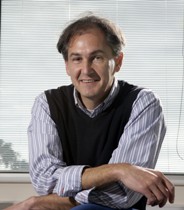Culture not genes drives humans forward
Release Date 27 February 2012

Evolutionary biologist at the University of Reading Professor Mark Pagel argues that our cultural influences are more important to our success as a species than our genes in his new book published this week.
In Wired for Culture: The Natural History of Human Co-operation, Professor Pagel says our true difference with other animals is our ability to adapt at the cultural level to different environments as we travel around the world, rather than having to wait for the slower pace of genetic evolution.
This created a species with a suite of adaptations for making use of the prosperous social environment of human culture, among them are our ultra-social nature, our language, morality and even some individual differences in talents and skills.
"These traits wouldn't exist without our propensity for culture - our ability to co-operate in small tribal societies, enabling us to pass on knowledge, beliefs and practices so that we prospered while others declined," said Professor Pagel.
He says other animals are limited to living in the environment their genes adapt them to, for example wildebeest can't climb trees for fruit, but yet the first humans to walk out of Africa and into the deserts of Saudi Arabia worked out how to make shelters, dig for water and domesticate camels.
"We didn't need to wait for our genes to change to confer adaptive advantage to living in the desert. We embrace our cultures and allow them a degree of mind control over us in return for the prosperity and protection they give in return."
Wired for Culture: The Natural History of Human Co-operation is published on 1 March by Allen Lane.
ENDS
For more information please contact Rona Cheeseman, Research Communications Manager, on 0118 378 7388 or email r.cheeseman@reading.ac.uk
Notes to editors
Mark Pagel is distinguished for having shown how a combination of phylogenetic trees of species and knowledge of their features can be used to reconstruct the evolutionary past and how it gave rise to the present. He has introduced novel statistical modelling techniques that provide solutions to outstanding problems of trait evolution. These solutions have influenced how evolutionary biologists and anthropologists conduct their science. He has used his approaches to address and solve questions of fundamental importance involving speciation, adaptation, punctuational evolution and human cultural and linguistic evolution.